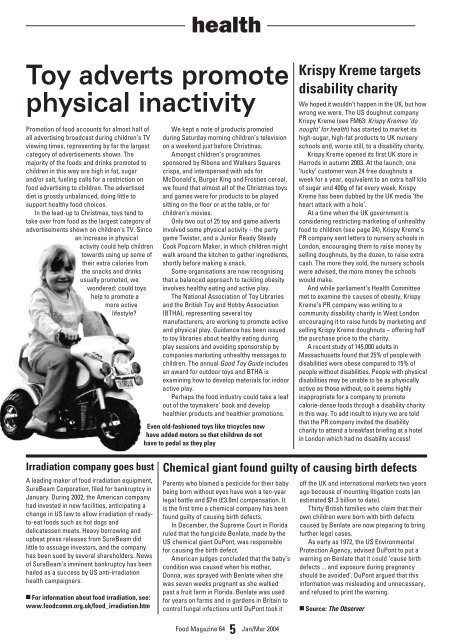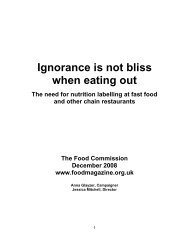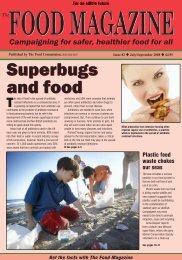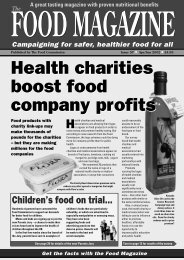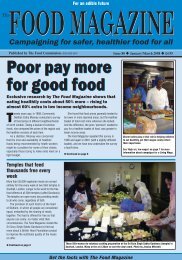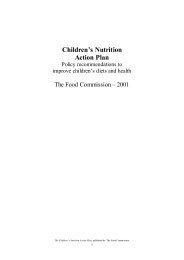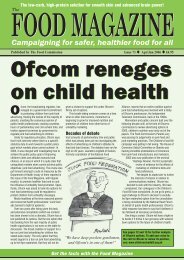Soft drinks - The Food Commission
Soft drinks - The Food Commission
Soft drinks - The Food Commission
- No tags were found...
You also want an ePaper? Increase the reach of your titles
YUMPU automatically turns print PDFs into web optimized ePapers that Google loves.
healthToy adverts promotephysical inactivityPromotion of food accounts for almost half ofall advertising broadcast during children’s TVviewing times, representing by far the largestcategory of advertisements shown. <strong>The</strong>majority of the foods and <strong>drinks</strong> promoted tochildren in this way are high in fat, sugarand/or salt, fueling calls for a restriction onfood advertising to children. <strong>The</strong> advertiseddiet is grossly unbalanced, doing little tosupport healthy food choices.In the lead-up to Christmas, toys tend totake over from food as the largest category ofadvertisements shown on children’s TV. Sincean increase in physicalactivity could help childrentowards using up some oftheir extra calories fromthe snacks and <strong>drinks</strong>usually promoted, wewondered: could toyshelp to promote amore activelifestyle?We kept a note of products promotedduring Saturday morning children’s televisionon a weekend just before Christmas.Amongst children’s programmessponsored by Ribena and Walkers Squarescrisps, and interspersed with ads forMcDonald’s, Burger King and Frosties cereal,we found that almost all of the Christmas toysand games were for products to be playedsitting on the floor or at the table, or forchildren’s movies.Only two out of 25 toy and game advertsinvolved some physical activity – the partygame Twister, and a Junior Ready SteadyCook Popcorn Maker, in which children mightwalk around the kitchen to gather ingredients,shortly before making a snack.Some organisations are now recognisingthat a balanced approach to tackling obesityinvolves healthy eating and active play.<strong>The</strong> National Association of Toy Librariesand the British Toy and Hobby Association(BTHA), representing several toymanufacturers, are working to promote activeand physical play. Guidance has been issuedto toy libraries about healthy eating duringplay sessions and avoiding sponsorship bycompanies marketing unhealthy messages tochildren. <strong>The</strong> annual Good Toy Guide includesan award for outdoor toys and BTHA isexamining how to develop materials for indooractive play.Perhaps the food industry could take a leafout of the toymakers’ book and develophealthier products and healthier promotions.Even old-fashioned toys like tricycles nowhave added motors so that children do nothave to pedal as they playKrispy Kreme targetsdisability charityWe hoped it wouldn’t happen in the UK, but howwrong we were. <strong>The</strong> US doughnut companyKrispy Kreme (see FM63: Krispy Kremes ‘donought’ for health) has started to market itshigh-sugar, high-fat products to UK nurseryschools and, worse still, to a disability charity.Krispy Kreme opened its first UK store inHarrods in autumn 2003. At the launch, one‘lucky’ customer won 24 free doughnuts aweek for a year, equivalent to an extra half kiloof sugar and 400g of fat every week. KrispyKreme has been dubbed by the UK media ‘theheart attack with a hole’.At a time when the UK government isconsidering restricting marketing of unhealthyfood to children (see page 24), Krispy Kreme’sPR company sent letters to nursery schools inLondon, encouraging them to raise money byselling doughnuts, by the dozen, to raise extracash. <strong>The</strong> more they sold, the nursery schoolswere advised, the more money the schoolswould make.And while parliament’s Health Committeemet to examine the causes of obesity, KrispyKreme’s PR company was writing to acommunity disability charity in West Londonencouraging it to raise funds by marketing andselling Krispy Kreme doughnuts – offering halfthe purchase price to the charity.A recent study of 145,000 adults inMassachusetts found that 25% of people withdisabilities were obese compared to 15% ofpeople without disabilities. People with physicaldisabilities may be unable to be as physicallyactive as those without, so it seems highlyinappropriate for a company to promotecalorie-dense foods through a disability charityin this way. To add insult to injury we are toldthat the PR company invited the disabilitycharity to attend a breakfast briefing at a hotelin London which had no disability access!Irradiation company goes bustA leading maker of food irradiation equipment,SureBeam Corporation, filed for bankruptcy inJanuary. During 2002, the American companyhad invested in new facilities, anticipating achange in US law to allow irradiation of readyto-eatfoods such as hot dogs anddelicatessen meats. Heavy borrowing andupbeat press releases from SureBeam didlittle to assuage investors, and the companyhas been sued by several shareholders. Newsof SureBeam’s imminent bankruptcy has beenhailed as a success by US anti-irradiationhealth campaigners.■ For information about food irradiation, see:www.foodcomm.org.uk/food_irradiation.htmChemical giant found guilty of causing birth defectsParents who blamed a pesticide for their babybeing born without eyes have won a ten-yearlegal battle and $7m (£3.9m) compensation. Itis the first time a chemical company has beenfound guilty of causing birth defects.In December, the Supreme Court in Floridaruled that the fungicide Benlate, made by theUS chemical giant DuPont, was responsiblefor causing the birth defect.American judges concluded that the baby’scondition was caused when his mother,Donna, was sprayed with Benlate when shewas seven weeks pregnant as she walkedpast a fruit farm in Florida. Benlate was usedfor years on farms and in gardens in Britain tocontrol fungal infections until DuPont took itoff the UK and international markets two yearsago because of mounting litigation costs (anestimated $1.3 billion to date).Thirty British families who claim that theirown children were born with birth defectscaused by Benlate are now preparing to bringfurther legal cases.As early as 1972, the US EnvironmentalProtection Agency, advised DuPont to put awarning on Benlate that it could ‘cause birthdefects ... and exposure during pregnancyshould be avoided’. DuPont argued that thisinformation was misleading and unnecessary,and refused to print the warning.■ Source: <strong>The</strong> Observer<strong>Food</strong> Magazine 64 5 Jan/Mar 2004


